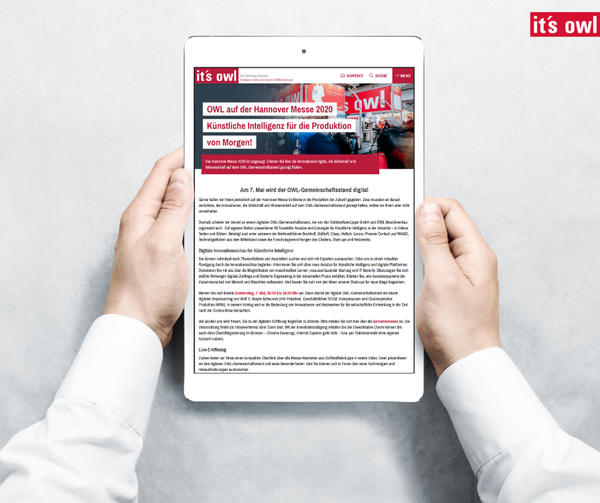The Institute for Industrial Information Technology (inIT) of the OWL University of Applied Sciences is one of the leading research institutions in the field of industrial automation. Among other things, the institute is currently working on the two projects ML4Pro2 and TeDZ, which should be presented on the basis of two exhibits at the Hannover Messe 2020. In the project "ML4Pro2", the inIT is researching the transferability of machine learning together with various research partners as part of the technology network it's OWL. The project aims to compile an interactive toolbox with AI and learning algorithms suitable for industry and thus also enable small and medium-sized manufacturing companies to use AI. The project "Technical Infrastructure for Digital Twins - TeDZ" aims to enable and significantly increase the access and interaction of products and resources along their lifecycle through an interoperable end-to-end technical infrastructure.
Benefits for companies
Artificial intelligence (AI) in industrial production processes has the potential to facilitate the development of technical solutions but also the maintenance and service of industrial machines. However, AI methods are often not easily transferable one-to-one to industrial production processes. Technical processes place increased demands on algorithms, such as high accuracy and precision, robustness to dynamic effects, and transparency in decision making. Research work at inIT identifies and addresses corresponding weaknesses in AI algorithms.
In the it's OWL project ML4Pro², inIT is researching AI and information fusion methods to robustly and transparently determine, predict and visualize states of technical systems. Patterns and information hidden in time series signals are learned through targeted transformations and processed in a comprehensible way for the user. Inaccuracies and uncertainties in single sensors and the resulting inconsistencies in multi-sensor systems, are solved by conflict-reducing information fusion. Thus, on the one hand, complex concepts are learned based on training data, and on the other hand, the fusion causes sensor dropouts and errors to have no impact on the actual application.
Digital twins are the virtual representation of physical, technical objects in the real world. Digital twins store data, map current and potential states,
name special characteristics of technical units and provide information about available services and algorithms. This holistic mapping of information is what makes digital twins possible in the first place - the meaningful and goal-oriented use of AI solutions in technical systems.
AI competencies
Intelligent technical systems, AI-based machine diagnostics and industrial image processing are among the core competencies at inIT. The goal of research activities at the institute is networked intelligent automation characterized by self-organization, self-optimization and self-diagnosis. Using methods of machine learning, cognitive systems, information fusion and orchestration, machines are evaluated with respect to their condition (condition monitoring), their need for maintenance is predicted (predictive maintenance) and their behavior is optimized (e.g. according to resource consumption or production quality). The special features and conditions of industrial systems are specifically taken into account. In order to deliver added value to technical systems, AI algorithms and models must be able to run on resource-constrained hardware. They must also be able to handle uncertainties and inaccuracies in data, be explainable, transparent and adaptable, and meet real-time requirements.


